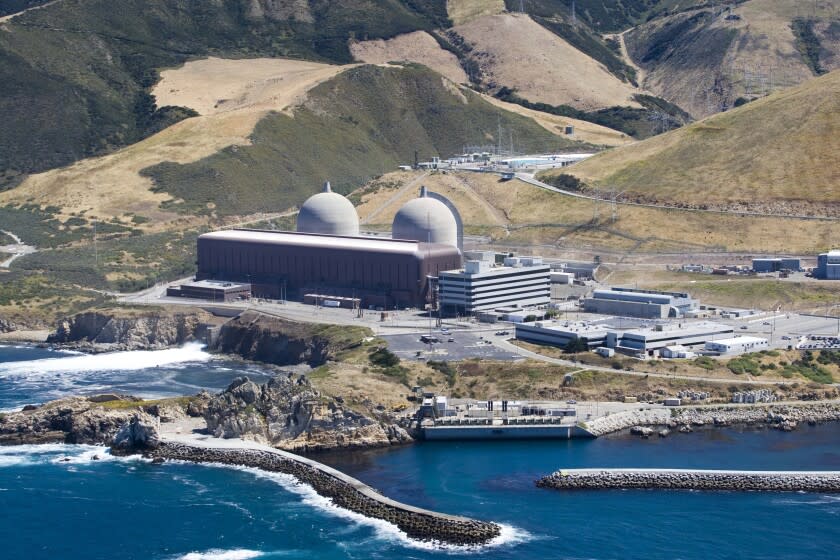Letters to the Editor: Nuclear power poses unacceptable risks. It's not a climate change solution

- Oops!Something went wrong.Please try again later.
To the editor: Jonah Goldberg's column, "If Biden is serious about the climate crisis, he should put nuclear on the table," is misleading.
The myth of "newer, safer, less expensive" nuclear power has promised for decades to deliver a magical climate solution. Unfortunately, despite billions of dollars in research and development, subsidies, loan guarantees and liability waivers, and countless promises that next-generation technology was "just around the corner," nuclear power is not and will never be that solution.
It is far too slow and costly to impact the climate crisis, and it presents insurmountable threats to public health that will worsen as the climate crisis grows. Radioactive waste generated by nuclear power will remain dangerous for thousands of years, burdening future generations for our short-sighted gain.
We need to stop wasting precious resources on false solutions that prop up uneconomical and polluting industries and invest instead in truly sustainable, community-driven solutions.
Denise Duffield, Santa Monica
The writer is associate director of Physicians for Social Responsibility-Los Angeles.
..
To the editor: Goldberg should make up his mind whether he thinks the climate crisis is no big deal, or it's so dire we must spend big on new nuclear plants.
He fails to consider that there is still no plan for long-term storage of spent nuclear waste in this country. Even if the proposed Yucca Mountain site had survived the protests of the citizens of Nevada — a state without any nuclear plants of its own — the fact remains there was no plan to safely transport the waste there anyway.
Meanwhile, a study by Oregon State University researchers reports that putting solar installations on just 1% of our agricultural land would meet all our demand for electricity while providing extra income for farmers, and the land can still do double duty growing forage or food crops.
Which electricity producer would you rather live next to?
Katrina Goldsmith, Cardiff
..
To the editor: I 100% agree with Goldberg about the need for nuclear power. The new technologies are cleaner and affordable. They don't pollute. France gets more than 70% of its electricity from nuclear energy; for Sweden, it's 40%.
Renewables like solar and wind are great, but we will never sell exclusively electric cars in California by 2035 on renewables alone. The math simply does not work. I have a Tesla, and it doubles my monthly electric bill, but it is still cheaper than buying gas.
Go nuclear to stop greenhouse gas pollution.
Jerry Marcil, Palos Verdes Estates
..
To the editor: Considering that the U.S. Department of Energy can't even decide where to put the nuclear waste that is already mounting up, why would we want to generate even more of it when it will sit in "temporary" storage areas, some of which are susceptible to sea-level rise?
Three Mile Island, Chernobyl and Fukushima are good examples of why nuclear power generation cannot be trusted as a safe source of power. Whether it is because of human error or otherwise, any mistake presents dangerous consequences to people in the areas surrounding nuclear plants.
The risks and costs are not worth investing more money into nuclear power.
Phillip Roullard, San Diego
This story originally appeared in Los Angeles Times.

